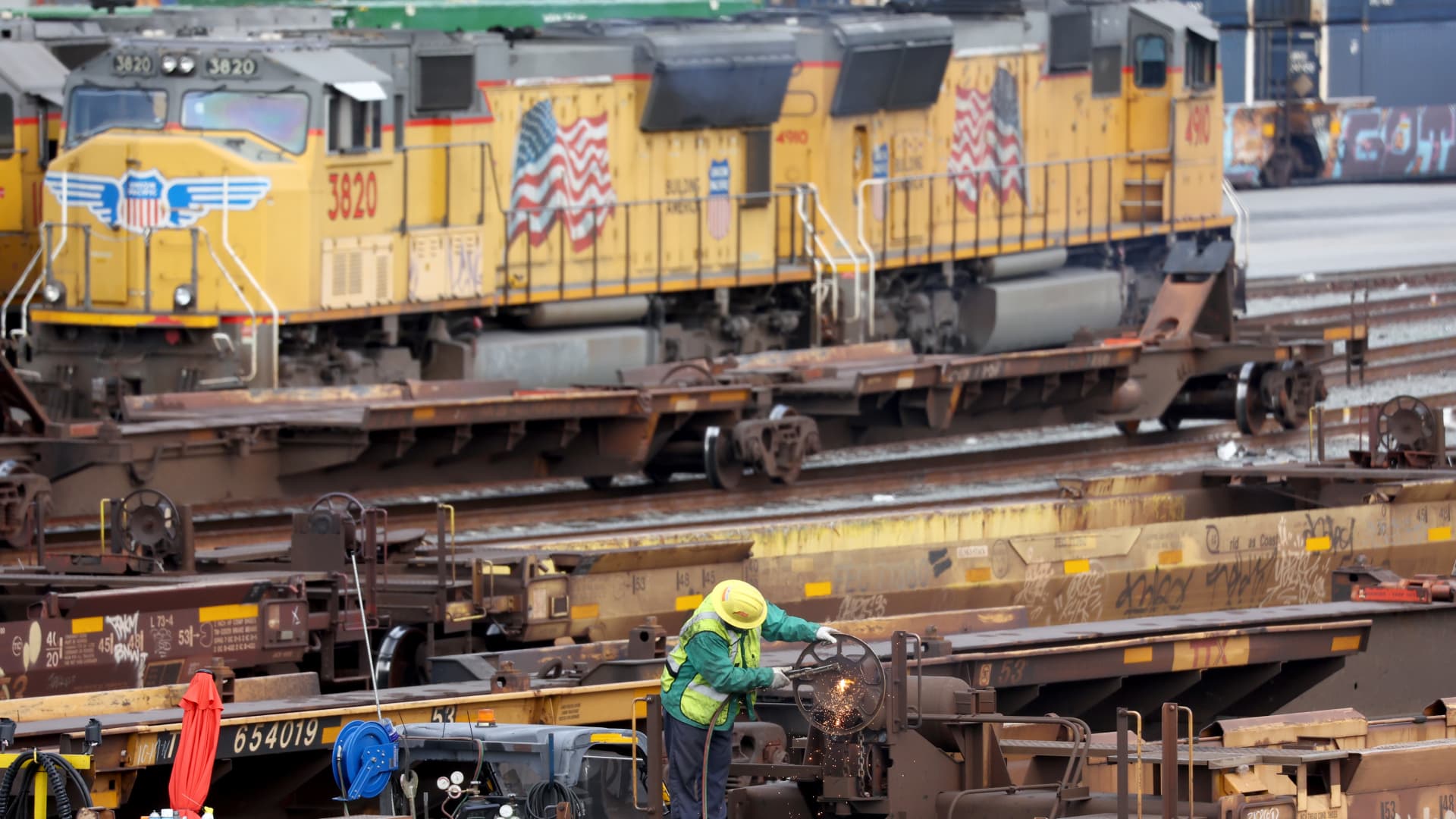For the primary time in 61 years, there’s a break up between the category 1 freight railroads in how they’re pursuing the following spherical of nationwide talks with labor unions that begins on Friday. Formal nationwide labor settlement negotiations with the rail employee unions, known as, “nationwide dealing with” have been carried out as a joint effort amongst most main rails, however Union Pacific has made the resolve to barter by itself with rank-and-file chapters on the native degree first.
“Union Pacific will not be taking part within the multi-employer bargaining coalition for the 2025 bargaining spherical,” stated an organization spokesperson. It’s as an alternative targeted on what the spokesperson known as hyper-local negotiations, targeted on native service, working effectivity, and the best way to serve prospects.
The choice leaves a trio of main freight rails — CSX, Norfolk Southern, and BNSF, a subsidiary of Berkshire Hathaway — within the group of rails that may search a nationwide deal collectively.
Canadian Pacific Railway (CPKC) will not be part of the nationwide bargaining for guidelines and wages.
Whereas they pursue a nationwide deal, the rails within the coalition have already reached 50 native agreements, and any carriers and unions which have reached and ratified agreements is not going to must take part within the nationwide bargaining spherical.
In accordance with the Nationwide Carriers’ Convention Committee, which represents the foremost freight rails in joint talks with unions, early agreements enhance pay by 18.8% over 5 years. Based mostly on present inflation forecasts, the rise will translate into actual wage development and pay certainty for the lifetime of the contract, in response to the NCCC. Mixed with the 24% wage enhance from the 2022 bargaining spherical, wages will enhance by 50% (compounded) from 2020–2029. Worker month-to-month health-care premiums will lower by greater than 10% in 2025, to $277/month (in comparison with a nationwide common of greater than $500/month for different employer-provided household protection), in response to the NCCC. Unionized staff may even have entry to extra paid trip earlier of their careers, a part of an effort to answer union calls for for higher work-life steadiness.
In accordance with the NCCC, most Class I rail staff earn between $90,000 and $140,000 in annual wages, relying on their craft, with common annual wages of $111,000. Including retirement, illness and medical insurance advantages the common complete compensation, ranges from $135,000 to $190,000 yearly, with a mean of roughly $160,000.
In a latest submit to members, Jeremy Ferguson, president of the biggest railroad union, SMART-TD, characterised the negotiation course of as “unchartered waters” as a result of it has by no means seen a tentative settlement come to fruition earlier than the scheduled negotiations begin, negotiations that are required below the Railway Labor Act.
“Undoubtedly, this situation is a bit uncommon to these of us who’ve been round for a decade or extra, and it’s much more unconventional to us as worldwide officers who’re normally engaged in nationwide negotiations each three to 5 years,” Ferguson wrote.
The adjustments come just a few years after a nationwide freight rail strike was barely averted after a interval of 2022 negotiations that Ferguson known as the “most contentious circumstances conceivable resulting from all of the carriers being hell-bent on attaining crew consist adjustments to take away conductors from by freight trains.”
In September 2022, the rail corporations and unions had tentatively agreed to a deal nevertheless it was later rejected by a majority of the unions’ rank-and-file members. Railroads began the embargo course of, which slows down provide chains. A strike was averted in December 2022 after Congress and President Joe Biden intervened to go the tentative settlement into legislation. On the time, the railroad trade warned the financial system would undergo harm of $2 billion per day; different trade teams warned of a direct hit to GDP and inflation spike.
“All of the unions are keen to interact in attempting and have a extra constructive spherical of negotiations in comparison with the final spherical,” stated Richard Edelman, labor lawyer with Mooney, Inexperienced, Saindon, Murphy & Welch Regulation Agency who represents BMWED, BRS, Good Mechanical, Firemen and Oilers, and does some work for Machinists unions. “A number of the carriers appear to be keen to interact earlier and have extra significant negotiations. Nonetheless, the unions are ready to agree solely on phrases which are acceptable to the workforce.”
He added, “Votes of union staff in the USA towards tentative agreements are likely to mirror the white-hot anger of union staff towards their employers. Tentative agreements are their solely likelihood for them to specific their frustration with their employer and their anger on the method they’ve been handled.”
Daniel Imbro, analyst at Stephen, stated is stunning to see the Class 1 rails negotiating with the unions independently.
“Whereas BNSF, CSX, and NSC have all reached agreements with a variety of their union workforce that has comparable phrases, the best way that is being completed is irregular relative to latest cycles,” stated Imbro. “I believe the early timing, began by CSX, signifies their prioritization of service proper now.”
He stated with inflation coming down, CSX may have probably held out longer in reaching agreements, however administration is keen to put money into the labor drive, even at a better price, to do its finest to make sure service. “This earlier negotiation may additionally permit CSX and others to make some adjustments to work guidelines, which may enhance the rails’ velocity and effectivity over time,” he stated.
A BNSF spokesperson stated it’s planning to attend the formal nationwide labor negotiations even because it has introduced 9 tentative union agreements, 5 of which have already been ratified. These agreements signify 53 p.c of BNSF’s union workforce.
BNSF has ratified agreements with the Nationwide Convention of Firemen & Oilers (NCFO), SMART-MD, American Tran Dispatchers Affiliation (ATDA), Transportation Communications Union (TCU), and the Brotherhood of Railway Carmen (BRC) unions. In addition they have tentative agreements with the Worldwide Brotherhood of Electrical Staff (IBEW), SMART-TD, SMART-TD-YDM, and the Worldwide Brotherhood of Boilermakers, Iron Ship Builders (IBB).
Norfolk Southern will take part within the bargaining spherical that opens Nov. 1 with these unions with whom they haven’t reached early agreements. As in previous rounds, Norfolk Southern will give their bargaining proxy to the Nationwide Carriers’ Convention Committee, which represents the nation’s freight railroads in nationwide collective bargaining.
Norfolk Southern has ratified agreements with the Nationwide Convention of Firemen and Oilers (NCFO), Brotherhood of Upkeep of Method Staff Division (BMWED), the American Prepare Dispatchers Affiliation (ATDA), the Worldwide Affiliation of Sheet Metallic, Air, Rail and Transportation Staff – Mechanical Division (SMART-MD), the Brotherhood of Railway Carmen Division/TCU (BRC), and the Transportation Communications Union (TCU). To this point, Norfolk Southern has reached tentative agreements with 10 of its 13 unions, overlaying roughly 67% of its craft workforce.
“The continued early progress we have made with our labor unions on ratifying new collective bargaining agreements give our craft colleagues peace of thoughts round wages and advantages,” stated Mark George, Norfolk Southern CEO, in a press release posted to its web site.
The newly ratified settlement supplies a 3.5-percent common wage enhance per yr over the following 5 years. It additionally presents Norfolk Southern railroaders extra trip earlier of their profession and makes important enhancements to well being care advantages.
Along with NCFO, BMWED, ATDA, BRC, SMART-MD, and TCU, Norfolk Southern has reached comparable tentative agreements, that are nonetheless topic to ratification, with the Worldwide Brotherhood of Electrical Staff (IBEW), the Worldwide Affiliation of Sheet Metallic, Air, Rail and Transportation Staff — Transportation Division (SMART-TD), the Worldwide Affiliation of Sheet Metallic, Air, Rail and Transportation Staff — Transportation Division Yardmasters (SMART-TD Yardmasters), and the Worldwide Brotherhood of Boilermakers and Blacksmiths (IBBB).
Imbro stated buyers are paying shut consideration to the negotiations.
“By way of UNP not taking part thus far, we are going to watch it intently as we head into year-end,” he stated. “The staff has been very targeted on enhancing prices and repair, and so maybe they’re opting to attend and see if they will safe decrease wage inflation in just a few months, however service can be scrutinized as we transfer nearer to that settlement.”
Imbro stated now that it is assumed most have locked in wage inflation of roughly 4% in yr one, the investor focus has shifted to cost.
“Can value exceed inflation and assist margin enlargement?” Imbro stated. “That is one in every of, if not, the first investor concern that we hear after these agreements have been reached.”



